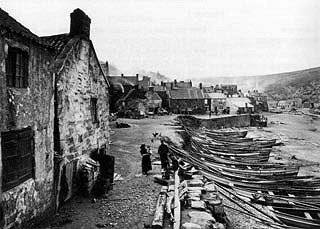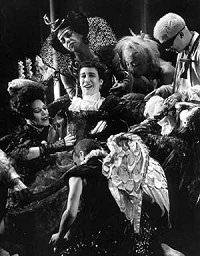The fourth very recent production of Rinaldo was a prestigious event, with corporate entertaining much in evidence, the draw being a rare London appearance by Cecilia Bartoli. Christopher Hogwood conducted the Academy of Ancient Music. (Duncan Hadfield has reviewed performances of the two versions of Rinaldo in S&H, July 1999).
 There
were two concert performances of the original version of Rinaldo at
the Barbican, during November, prior to a Decca studio recording. The
international star singers were cast from strength, with one as eminent as
Catherine Bott accepting a tiny part. Bartoli sang Almirena's four arias
with beautiful tone and a good attempt at dramatic conviction, despite the
story's absurdities of magic transformations and role switching. The villainous
Armida (Luba Orgaonasova, soprano) transformed herself into the form
of Almirena, so Bartoli obligingly sang those passaages for her, which added
to the general confusion on stage and off. There were three counter tenors,
all north American, the brunt borne by David Daniels as Bartoli's
betrothed, who sang through agonies of indecision and conflict until the
eventual happy ending. The bad king Argante (sung by Nathan Berg on 17 November)
and his lover, the sorceress Armida, had some of the best tunes, as is often
the way, and seized their opportunities.
There
were two concert performances of the original version of Rinaldo at
the Barbican, during November, prior to a Decca studio recording. The
international star singers were cast from strength, with one as eminent as
Catherine Bott accepting a tiny part. Bartoli sang Almirena's four arias
with beautiful tone and a good attempt at dramatic conviction, despite the
story's absurdities of magic transformations and role switching. The villainous
Armida (Luba Orgaonasova, soprano) transformed herself into the form
of Almirena, so Bartoli obligingly sang those passaages for her, which added
to the general confusion on stage and off. There were three counter tenors,
all north American, the brunt borne by David Daniels as Bartoli's
betrothed, who sang through agonies of indecision and conflict until the
eventual happy ending. The bad king Argante (sung by Nathan Berg on 17 November)
and his lover, the sorceress Armida, had some of the best tunes, as is often
the way, and seized their opportunities.

At the performance I attended Nathan Berg, a splendid dark baritone, impressed me most of all the singers, for his strong characterisation and spot-on ensemble, never lagging behind the beat as did several others. (He is featured on Volume 29 of the Hyperion Schubert Edition, giving a splendid account of the 19 minute Einsamkeit D626 with Graham Johnson, CDJ33029.)
This was a worthy evening, but for me limited by the stolid conducting of Christopher Hogwood, who never seemed to glance back to make any contact with the singers. It sometimes felt as if they were already making that CD! A complete contrast from Trevor Pinnock's serendipitous La Resurrezione (S&H, October) or Sir Charles MacKerras's sympathetic and flexible conducting of Alcina.
ENO's Alcina on 29 November will be talked of in the future as one of those rare evenings at the opera when everything comes together and you feel anew that this is the finest of all the performance arts. This production is certain to be hugely popular and present a real challenge to Covent Garden, now re-opening.
|
All the lead singers were excellent, negotiating their dazzling roulades with apparent ease whilst maintaining character through gesture and the most subtly choreographed movement. Joan Rodgers, surrounded by grotesque slinking spirits in attendance, sang the title role well throughout, and enjoyed numerous costume changes before finally becoming victim of her failing magical powers. I was greatly taken by Lisa Milne as Alcina's sister, who is quickly embroiled in cross dressing confusions, falling for a woman disguised as a man and singing with charm and accuracy whilst negotiating complicated stage movements, in a story of sorcery & transformation, one of Handel's 'magical' operas. Sarah Connolly, as a knight who eventually escapes Alcina's spell, has to present herself in masculine and feminine guise, and does so with equal authority in her carriage and her immaculate singing, perhaps the most memorable of them all. Rather than praising all the singers individually, I prefer to list the director, David McVicar; Michael Vale, designer of the elaborate sets lit by Paule Constable, Sue Blane (costume designer), Michael Keegan-Dolan, (choreographer) and Amanda Holden (translator). The company style and ensemble was of a quality that, not many decades ago, was only to be found at Glyndebourne. |
Sir Charles MacKerras conducted a performing version from a score prepared by Clifford Bartlett, editor of the Early Music Journal, which contrives to be both learned and entertaining, as was ENO's new Alcina. This costly production brought together allusions to the Age of Enlightment with eighteenth century fascination with magic and stage machinery. There are layers upon layers of allusions, discussed in the readable and fully illustrated programme book. Too clever by three-quarters, you might think, but it all meshes and works. Rather than attempting to describe the intricacies of McVicar's conception, I would urge people everywhere to make the journey to London to see ENO's 1999 Alcina. A palpable hit!
 The next night, back to the Coliseum for the latest revival of
their 1991 production of Benjamin Britten's Peter Grimes. Fearing
an anticlimax, it pleased me greatly. I have recently been rehearing its
predecessor Paul Bunyan in the new Chandos recording and the development
of Britten's musical language and command of dramatic form to full maturity
in just a few years is breathtaking.
The next night, back to the Coliseum for the latest revival of
their 1991 production of Benjamin Britten's Peter Grimes. Fearing
an anticlimax, it pleased me greatly. I have recently been rehearing its
predecessor Paul Bunyan in the new Chandos recording and the development
of Britten's musical language and command of dramatic form to full maturity
in just a few years is breathtaking.
Paul Daniel, ENO's Music Director, was conducting his first Peter Grimes, and the orchestral playing was powerful and focused, as too was the singing of the large chorus. It is their scapegoating of the misfit fisherman which precipitates the final tragedy and dashing of all hopes of a new beginning. No more than semi-realistic, they were deployed with skill yet allowed to indicate individuality as well as mass reactions. The numerous individuals in the small sea front community were likewise pointedly characterised, their text well projected, and the American Robert Brubaker a real find with a new slant as the eponymous anti-hero, with whom one finally empathises as he embraces his inevitable fate.
Recommended recording:
Benjamin Britten Peter Grimes Philip Langridge, Matthew Best, Roderick Williams, Anne Collins, London Sinfonia cond. Richard Hickox Chandos CHAN94478 2CD Set
Peter Grahame Woolf


 Return to:
Return to: